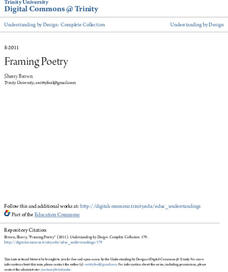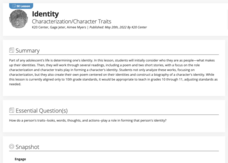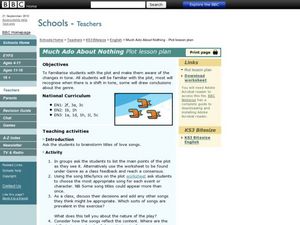K20 LEARN
Comparing/Contrasting Characters Through Two-Voice Poems: Characterization
Two babies, two fathers, two experiences, two worlds. Partners craft two-voice poems to capture the points of view of two men with very different lives who have just become fathers.
Curated OER
Text Elements—Vampires
Students explore the tone and style of passages from horror genre literature. For this literary elements lesson, students read The Vampire by John Stagg and the War of the World script by H.G. Wells, Students write about the way the...
Curated OER
When I Heard the Learned Astronomer
Students recognize different purposes and methods of writing and to identify a writer's tone and point of view.
Curated OER
"Declaration (of a Kgomotso Girl)"
Students explore the poem, "Declaration." Students discuss how elements of poetry such as tone work to convey meaning. Students compare and contrast their lives and the lives of the poem's characters from South Africa.
Colorado Springs School District
AP Literature and Composition Reading and Writing Transition Tasks
Worried about the summer slide? Scholars keep literature skills sharp by working through a summer packet to prep for AP Literature classes. Pupils annotate and close read short stories, answer questions about a variety of literary...
Fluence Learning
Writing About Literature: Nature in the Writings of John Muir and Emily Dickinson
As an assessment of their skill in crafting a compare and contrast essay, class members read and compare the portrayals of nature in excerpts from naturalist John Muir's My First Summer in the Sierra and from poet Emily Dickinson's "The...
Prestwick House
Discovering Genre: Poetry
Work on literal and figurative meanings with a lesson focused on Robert Frost's "After Apple-Picking" and "The Road Not Taken." Readers identify the literary devices used by the poet to set the poems' themes, settings, and narrative...
PBS
The Power of Personal Narrative
Personal narratives are powerful things. Whether told from the first-person or third-person point of view, whether in the form of an essay, a short story, novel, or video, whether fiction or fact, they capture readers and give them...
Simon & Schuster
Curriculum Guide to: Adventures of Huckleberry Finn by Mark Twain
Five lessons make up a curriculum guide to The Adventures of Huckleberry Finn. Readers find examples of Twain's use of irony, closely examine Huck's colloquial language, as well as his sense of morality, and identify themes in the novel....
Academy of American Poets
Teach This Poem: "On Being Brought from Africa to America" by Phillis Wheatley
Phillis Wheatley's poem, "On Being Brought from Africa to America" is the focus of a lesson that asks readers to consider how the poem is a critique of slavery. Groups comprise a list of words and phrases they notice as well as questions...
Academy of American Poets
Teach This Poem: "Old South Meeting House" by January Gill O'Neil
The vaulted ceiling of the Old South Meeting House has heard many voices. Young scholars read an excerpt about its importance in American history and then do a close reading January Gill O'Neil's poem, "Old South Meeting House." After...
National Endowment for the Humanities
The Realism in Magical Realism
A lesson on magical realism has young historians research how Garcia Marquez weaves historical events and his own experiences into One Hundred Years of Solitude. Using historical records and information found in a biography of Garcia...
National Endowment for the Humanities
García Márquez’s Nobel Prize Speech: “The Solitude of Latin America”
To conclude a study of One Hundred Years of Solitude, class members analyze Gabriel Garcia Marquez's Nobel Prize in Literature acceptance speech. After a whole-class discussion of the main ideas in the speech, individuals draft a...
Trinity University
Framing Poetry
The big idea in this poetry unit plan is that structure and content work together to create meaning. Class members learn how to identify and mark the metrical patterns and line lengths used in poems. They study the structure of various...
K20 LEARN
Identity: Characterization/Character Traits
"Who am I?" Guy de Maupassant's short story "The Necklace," Julio Naboa Polanco's poem "Identity," and a clip from a Jason Bourne film provide learners with a context to consider the traits that makeup identity. Scholars create a...
K20 LEARN
Speak Your Truth: Techniques in Spoken Word Poetry
As part of a study of Spoken Word Poetry, class members watch a series of performance videos and note where poets get their ideas and the performance techniques used by the poets. Pupils then draft and share their poems.
K20 LEARN
Voices from the Past: History and Literature
Art can enhance the understanding of history. That's the big idea in a lesson that has young scholars read Randall Jarrell's poem "The Death of the Ball Turret Gunner" and an excerpt from John Hersey's Hiroshima, which provide a...
Curated OER
Abigail’s Daily Life
Young scholars continue their analysis of Abigail Adam's letters looking in this lesson plan at what they reveal about her daily life and concerns about the increasing political tensions with the British.
Texas Education Agency (TEA)
Simile and Metaphor (English III Reading)
The key idea in this interactive exercise designed for high schoolers is that figurative language, especially similes, and metaphors, add layers of meaning to a text. Users examine examples from speeches, ads, movie dialogue, and poems,...
Curated OER
John Gary Evans and the Politics of Race
Students read letters written by Evans and Gunton regarding race relations. For this Progressive Movement lesson, students interpret the intentions and tone of the letters to understand contemporary racial beliefs. Students discuss the...
Curated OER
Literary Data Collection Chart
Here’s a matrix that could be used with any literary work. For each assigned passage, readers are asked to record information about characters, setting, vocabulary, literary devices, symbols, tone, mood, etc. In addition, they are asked...
K20 LEARN
Argument Is Everywhere: Introduction to Argument
C.E.R = Claim + Evidence + Reasoning. That's the framework behind building a solid piece of argument writing. Introduce young writers to this format with an engaging lesson that uses YouTube videos and a PowerPoint to illustrate the...
Curated OER
The Witch of Goingsnake
Students complete literary analysis and writing activities using The Witch of Goingsnake. In this literary analysis lesson, students interpret a proverb, read poems, complete a quaker reading, and complete research for the lesson....
Curated OER
Much Ado About Nothing Plot Lesson Plan
Students explore tone in "Much Ado About Nothing." In this literary elements lesson plan, students list the main points of the plot, identify shifts in tone, and select love songs that reflect the tone of events and/or characters.
Other popular searches
- Mood and Tone
- Mood and Tone Worksheet
- Tone Mood
- Teaching Mood and Tone
- Author's Tone and Mood
- Analyzing Tone and Mood
- Author's Tone
- Tone and Mood Powerpoint
- Frost Poetry Tone
- Literary Elements Tone
- Voice, Tone, Audience
- Tone of Voice

























